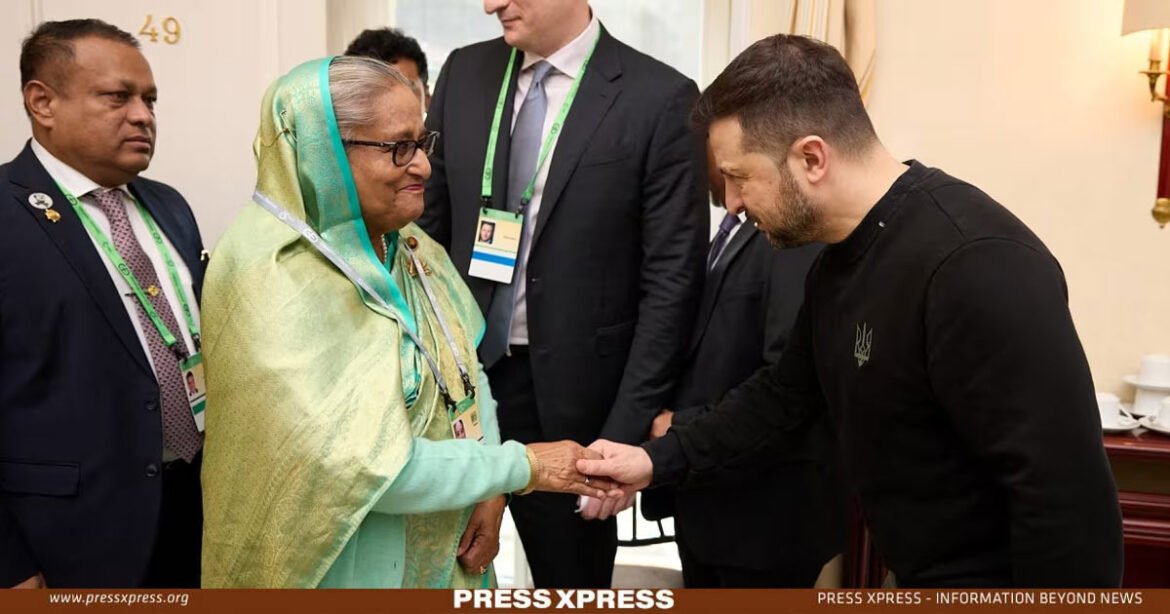Key highlights:
- Sheikh Hasina’s main highlight was her six-point proposal on climate change and security, presented at the MSC Panel discussion “From Pocket to Planet: Scaling up Climate Finance” on February 16.
- On February 16, Prime Minister Hasina met with German Chancellor Angela Merkel to discuss bilateral relations and cooperation between Bangladesh and Germany.
- Prime Minister Hasina engaged in talks with Danish Prime Minister Mette Frederiksen on February 17, focusing on the progress and potential of the Bangladesh-Denmark partnership.
- Alongside the bilateral and multilateral meetings, the World Bank committed $16 billion to 56 ongoing projects and pledged $509 million in budgetary support to Bangladesh.
Prime Minister Sheikh Hasina was engaged in bilateral meetings with numerous world leaders whilst attending the 60th Munich Security Conference (MSC) and this marks her inaugural foreign journey since winning her fourth consecutive term in the January 2024 general elections.
You Can Also Read: Bangladesh Seeks Global Alliances for Laundered Fund Recovery
The MSC is a prestigious forum for discussing international security policy, attracting over 50 heads of government, 100 ministers, and delegates from various countries. The theme of this year’s conference was “Lose-Lose?”, reflecting the challenges and uncertainties in the current global order. The conference covered a wide range of topics, such as climate change, cyber security, nuclear proliferation, terrorism, migration, and human rights, and her visit was widely seen as a demonstration of Bangladesh’s proactive stance on global security issues and its commitment to strengthening ties with Europe and other strategic partners.
Six-Point Proposal on Climate Change and Security
One of the main highlights of Sheikh Hasina’s visit was her six-point proposal on climate change and security, which she presented at the MSC Panel discussion “From Pocket to Planet: Scaling up Climate Finance”, on February 16. She urged world leaders to take urgent actions to address the adverse impacts of climate change on peace and stability, especially for the most vulnerable countries like Bangladesh. Her proposal included the following points:
- Unlocking climate change funds for vulnerable countries, ensuring easy finance and technology access.
- Ending the arms race, redirecting resources to climate financing and sustainable development.
- Implementing the Paris Agreement, fulfilling developed countries’ commitments.
- Strengthening the UN’s role in addressing climate-related security risks through multilateral cooperation.
- Promoting regional initiatives like SAARC for climate change and security.
- Raising awareness, and building capacity on climate change and security at all levels.
Sheikh Hasina also delivered a speech at the MSC, where she emphasized the need for multilateral cooperation and dialogue to address the common security threats and challenges. She called for a peaceful resolution of the Rohingya crisis, which has created a humanitarian and security crisis in the region.
“I reiterate Bangladesh’s stance of providing temporary shelter to over one million Rohingya refugees who fled from Myanmar, and urge the international community to exert pressure on Myanmar to ensure their safe and dignified repatriation. I also express my concern over the rise of extremism and intolerance in the world, and stress the importance of promoting a culture of peace and harmony.”
– Prime Minister Sheikh Hasina

A recap of Sheikh Hasina’s Meetings with World Leaders
In the afternoon of 16 February, she participated in the inaugural session of the three-day conference held at the Conference Hall of Munich’s Hotel Bayerischer Hof. Before joining the opening session of the MSC, she convened with Prime Minister Abdulrahman Al-Thani of Qatar at Hotel Bayerischer Hof.
On February 16, Prime Minister Hasina met with German Chancellor Angela Merkel to discuss bilateral relations and cooperation between Bangladesh and Germany. Emphasis was placed on collaboration in trade, investment, education, and climate change initiatives. Both leaders exchanged views on regional and global issues, including the Rohingya crisis, the COVID-19 pandemic, and the Indo-Pacific strategy.
“Bangladesh is a valued partner of Germany in South Asia and beyond. We commend its remarkable economic and social progress, as well as its humanitarian leadership in hosting the Rohingya refugees. We want to enhance our dialogue and collaboration on regional and global issues of mutual interest.”
– German Chancellor Angela Markel

Prime Minister Hasina engaged in talks with Danish Prime Minister Mette Frederiksen on February 17, focusing on the progress and potential of the Bangladesh-Denmark partnership. Renewable energy, green growth, social development, digital transformation, and artificial intelligence were among the topics discussed. Prime Minister Hasina appreciated Denmark’s ongoing assistance and cooperation and invited Prime Minister Frederiksen to visit Bangladesh at her earliest convenience.
“We appreciate the generous hospitality of Bangladesh towards the Rohingya refugees and we support the efforts to find a durable solution to this humanitarian crisis. We also commend Bangladesh for its remarkable economic and social development in recent years.”
– Danish Prime Minister Mette Frederiksen
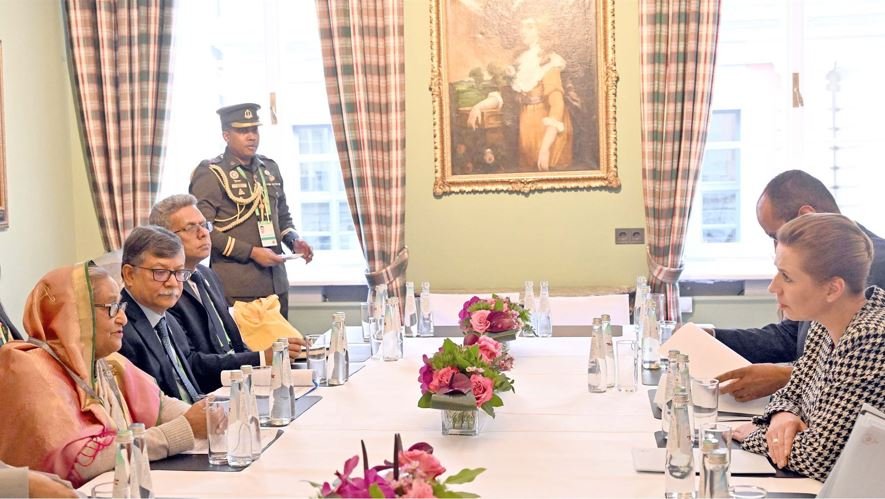
Prime Minister Hasina also engaged with Ukrainian President Volodymyr Zelensky on February 17 highlighting Bangladesh’s support for Ukraine’s sovereignty and territorial integrity, especially within the United Nations. President Zelensky expressed gratitude for Bangladesh’s backing and invited the country to attend the inaugural Global Peace Summit. Discussions also encompassed cooperation in trade and economic spheres, including the delivery of Ukrainian agricultural products to Bangladesh.
“Bangladesh is always against any kind of war. War was not beneficial for anyone ever. The war does not bring any good for the countries involved and their people who suffer … others may take advantage of the war. I appeal to all to seek ways to stop wars as Bangladesh adopts a foreign policy of friendship to all and malice towards none.”
– Prime Minister Sheikh Hasina
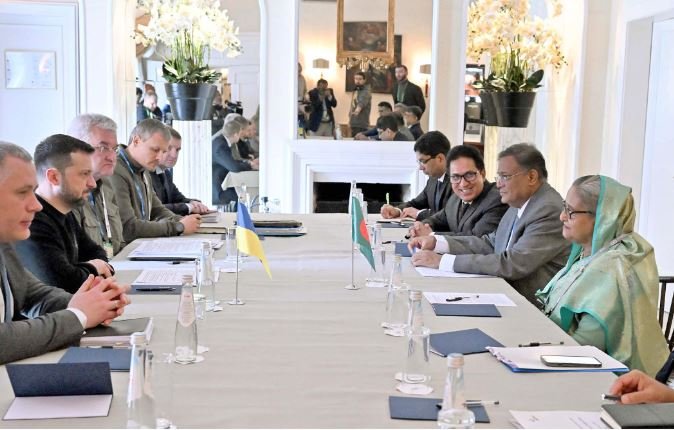
On February 18, Prime Minister Hasina and Dutch Prime Minister Mark Rutte reaffirmed their commitment to enhancing bilateral ties, particularly in water management, agriculture, and maritime affairs. Prime Minister Hasina extended an invitation to Prime Minister Rutte to visit Dhaka, acknowledging the Netherlands’ friendship and generosity.
Later in the same day, during a meeting with Indian External Affairs Minister S. Jaishankar, Prime Minister Hasina reviewed the progress of bilateral relations and cooperation between Bangladesh and India. At the same location, the UK’s Secretary of State for Foreign, Commonwealth, and Development Affairs David Cameron had a meeting with the prime minister later on.
“We are also closely coordinating on regional and global issues of common concern. We support Bangladesh’s role as the current Chair of BIMSTEC and the next Chair of SAARC. We appreciate Bangladesh’s humanitarian efforts in hosting the Rohingya refugees and urge the international community to assist in their safe, dignified, and voluntary return to Myanmar.”
– Indian External Affairs Minister S. Jaishankar
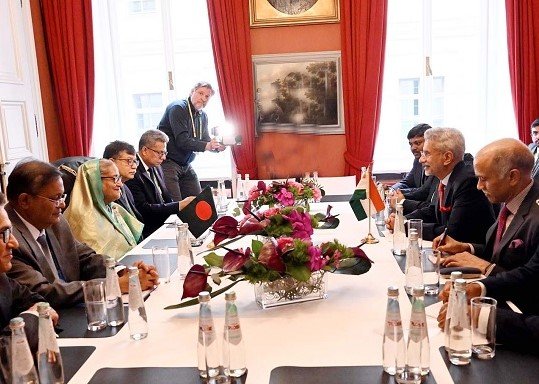
Prime Minister Hasina engaged in a discussion with UN Secretary-General António Guterres on the role of the UN in addressing global security challenges and the need for multilateral reform. Topics included the Rohingya refugee crisis, COVID-19, and climate change. She expressed appreciation for Guterres’ leadership and assured cooperation with the UN.
“Prime Minister Sheikh Hasina and I had a very productive meeting on the sidelines of the MSC 2024. We exchanged views on various issues of mutual interest, including the Covid-19 pandemic, the COP27 outcomes, the SDGs, the LDC graduation, and the peace and security challenges in the region and beyond. I commended her for her visionary leadership and her remarkable achievements in development, diplomacy and in tackling the Covid-19 pandemic.”
– UN Secretary-General António Guterres

Alongside the bilateral and multilateral meetings, the World Bank committed $16 billion to 56 ongoing projects and pledged $509 million in budgetary support to Bangladesh. Moreover, it recently promised $700 million to support Rohingya refugees and impoverished communities.
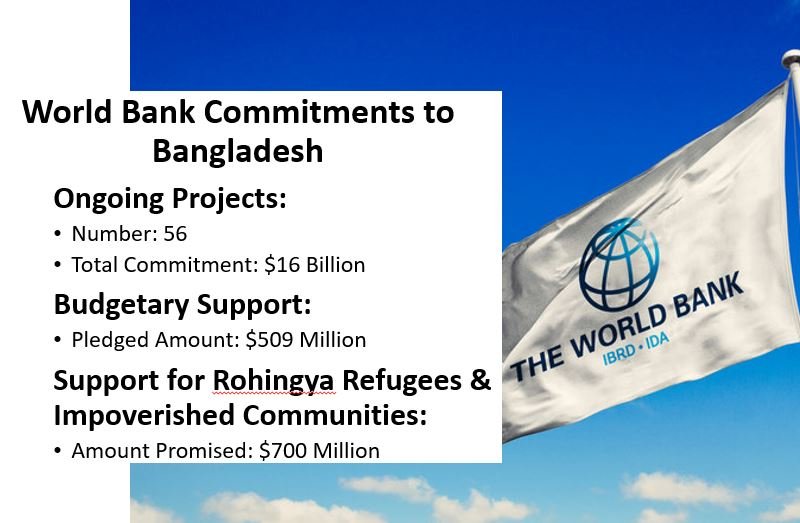
Through a series of bilateral meetings, Prime Minister Hasina secured essential partnerships and generated new possibilities for cooperation, revealing Bangladesh’s readiness to face global challenges with diplomacy and determination. Her visit encouraged relations with key allies and accentuated Bangladesh’s growth as a symbol of progress and resilience.

